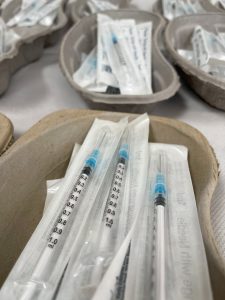Home » What Is Vivitrol and How Is It Abused?
What Is Vivitrol and How Is It Abused?

Unlike competing drugs, there is no likelihood of Vivitrol abuse, making it the safest of the pharmacological interventions used in MAT (medication-assisted treatment).
WHAT IS VIVITROL?
Vivitrol is an extended-release formulation of naltrexone. The medication binds to your brain’s opioid receptors, preventing further opioid use from activating those sensors. This renders substance abuse while on Vivitrol pointless since you will not experience the rewarding effects of opioids while taking this medication.
A single dose (380mg) of Vivitrol is administered once each month. A medical professional will administer the medication via intramuscular injection. The extended-release formulation of this medication means that Vivitrol is continuously delivered over the following month. Effects of the medication will diminish as the month unfolds.
The injectable form of Vivitrol means medication compliance is improved and there is no chance of missing a dose or deciding not to take the opioid antagonist.
Before you start treatment with Vivitrol, you need to be at least one week opioid-free. This means the medication is most frequently administered after opioid detox.
WHY IS VIVITROL PRESCRIBED?
Vivitrol is administered as part of a comprehensive treatment program to minimize the cravings central to early alcohol or opioid withdrawal.
In 2006, the FDA approved Vivitrol in the form of naltrexone for treating alcohol use disorder.
In 2010, the medication became the first non-narcotic and non-addictive medication approved by the FDA for treating opioid use disorder.
In mid-2017, Tom Price (U.S. Secretary of Health and Human Services) stated that methadone and suboxone – approved medications traditionally used to treat opioid use disorder – were substituting one addictive substance for another. Price cited Vivitrol as a superior alternative.
Vivitrol is typically recommended in these scenarios:
- As one component of a comprehensive treatment plan incorporating behavioral interventions like counseling and psychotherapy (talk therapy).
- To prevent relapse after detoxification and 7 days of abstinence from opioids.
- For the treatment of alcohol dependence in those who have stopped drinking and are engaged in outpatient treatment for alcohol addiction.
Vivitrol is not typically recommended in these scenarios:
- If you are still using opioids.
- For those who are physiologically dependent on opioids.
- People hypersensitive to the effects of naltrexone.
- During acute opioid withdrawal before detox.
- For those with liver or kidney problems.
ARE THERE RISKS ASSOCIATED WITH LEGITIMATE MEDICAL USE OF VIVITROL?
Unlike competing opioid addiction medications, Vivitrol has no potential for abuse.
Vivitrol for alcohol abuse is not an abstinence-based drug. Only disulfiram discourages the consumption of alcohol. A Vivitrol alcohol abuse combination simply cancels out the rewarding effects of alcohol, rendering it senseless to drink.
There is no risk of physical dependence building, making Vivitrol safe for use in ongoing medication-assisted treatment.
That said, there are three primary dangers associated with the legitimate use of Vivitrol:
- Rapid opioid withdrawal
- Heightened risk of overdose
- Reactions at the injection site
RAPID OPIOID WITHDRAWAL
Sudden opioid withdrawal can manifest if you abruptly discontinue the use of opioids. This is inadvisable and potentially dangerous.
Before you take Vivitrol, you should abstain from opioids and any medication containing buprenorphine or methadone for at least seven days. If you start taking Vivitrol with opioids still in your system, this can trigger the presentation of withdrawal symptoms so intense that you require hospitalization.
This outcome can be avoided if you abstain from opioids during a medically supervised detox before Vivitrol is administered.
HEIGHTENED RISK OF OVERDOSE
If you take Vivitrol, you are at heightened risk of experiencing an overdose due to the way the medication blocks the effects of opioids. If you are in a non-clinical setting, it might be tempting to take more opioids in an attempt to experience the rewarding high. This will not deliver the intended outcome but may result in an overdose. Opioid overdose can be life-threatening.
Additionally, the effects of Vivitrol will become less pronounced over the month. If you take opioids, this can bring about an unexpected overdose. Sensitivity to opioids is increased after detoxification, immediately before an injection of Vivitrol, and after stopping treatment.
REACTIONS AT THE INJECTION SITE
Some people experience adverse reactions at the site of Vivitrol injections. This can cause tissue death that requires corrective surgery if untreated.
Consult your treatment provider if you experience:
- Blistering
- Severe swelling
- Lumps
- Extreme pain
- Open wounds
- Dark colored scabs
- Hardening around injection site
DOES VIVITROL “CURE” ADDICTION?
Vivitrol does not cure addiction, and this is not the intended purpose of the medication.
Addiction, clinically termed substance use disorder, is an incurable brain disorder. While there is no cure for opioid addiction or alcoholism, Vivitrol can be an effective component of treatment.
HOW SHOULD VIVITROL BE USED?
Vivitrol should be used in conjunction with behavioral interventions since medication-assisted treatment is not a cure for addiction.
Counseling will help you to understand your personal triggers for addiction and will equip you with a variety of skills useful in your ongoing recovery.
Psychotherapeutic interventions like CBT (cognitive behavioral therapy) will help you to change destructive thoughts and behaviors and to develop healthy coping mechanisms to avoid stressors derailing your recovery with relapse.
WHAT ARE THE SUCCESS RATES OF MAT WITH VIVITROL?
Research from NIDA (National Institute on Drug Abuse) found that a monthly Vivitrol injection was equally as effective as suboxone, its main competitor. Around half of study participants who took Vivitrol or suboxone remained abstinent six months later.
The trial used to secure approval from the FDA shows that over 50% of those study participants addicted to heroin remained relapse-free throughout the six-month study. Vivitrol was demonstrated to be three times more effective than naltrexone tablets at preventing relapse. Cravings decreased significantly in those administered Vivitrol.
This study also indicates that participants administered Vivitrol were less likely to relapse by a factor of 17. Treatment retention was also improved among those administered Vivitrol.
CAN VIVITROL BE ABUSED?
Vivitrol has no abuse potential when used in a supervised medical setting.
Occasionally, people attempt to take large quantities of opioids in combination with Vivitrol. This is ineffective and likely to cause overdose.
The lack of abuse potential is one of the key benefits of this medication.
WHAT HAPPENS IF YOU RELAPSE WHILE TAKING VIVITROL?
If you relapse when taking Vivitrol, this can cause opioid overdose as your body becomes more sensitive to opioids. Opioid overdose can trigger life-threatening coma and should be treated as a medical emergency.
TREATMENT FOR ALCOHOL AND OPIOID ADDICTION AT GRATITUDE LODGE
Whether you are addicted to alcohol or opioids, you will find that medication-assisted treatment can streamline detox and encourage ongoing abstinence.
Gratitude Lodge has affordable luxury rehab facilities located in San Diego, Newport Beach, and Long Beach where you can initiate your recovery in a pet-friendly environment with no triggers or distractions.
Choose from the following services:
- Supervised medical detox
- MAT (medication-assisted treatment)
- 30-day inpatient rehab
- IOP (intensive outpatient program)
When you take advantage of medication-assisted treatment for opioid use disorder or alcohol use disorder at Gratitude Lodge, you will have access to medications like Vivitrol. MAT is always most beneficial when delivered alongside behavioral interventions. We offer the following modalities in our inpatient detox and rehab programs in Newport Beach and Long Beach:
- Individual counseling
- Group therapy
- Family therapy
- Holistic therapy
- Psychotherapy
- Daily meetings
- 12-step immersion program
For help addressing the physical and psychological component of addiction with medications like Vivitrol and psychotherapeutic interventions like CBT, call Gratitude Lodge right now at 800-994-2184.
RESOURCES

Don’t Let Addiction Control You











